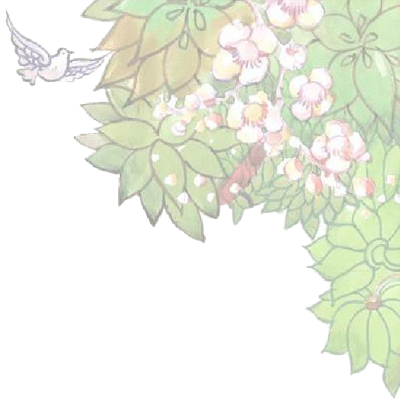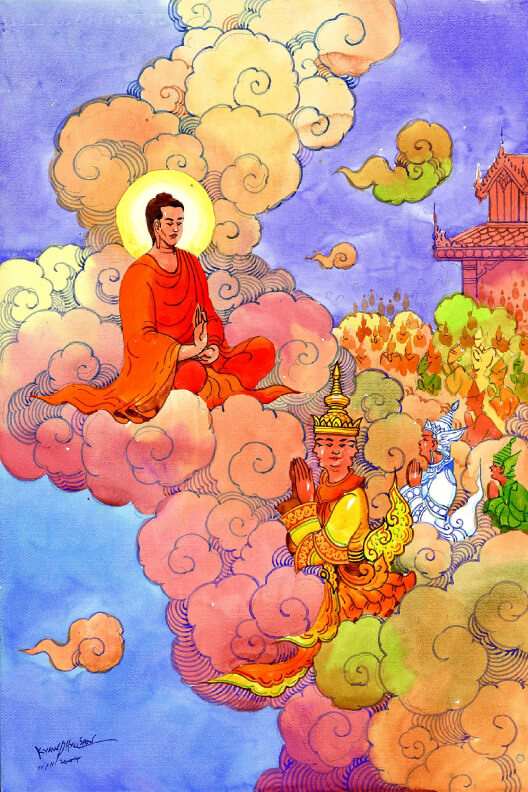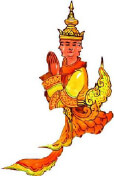56話 永遠論に囚われたバカ梵天

第5部 さまざまな「悪」ブッダをめぐる人々
第2章 邪見の神々
56話 永遠論に囚われたバカ梵天

あるとき、世尊はサーヴァッティのジェータヴァナ僧院(祇園精舎)に住まわれていて、比丘たちを呼び、「梵天招待経(ブラフマニマンタカスッタ)」(中部49)といわれる法話を語られた。
「比丘たちよ、ある折、わたしはウッカッターの街(訳注:ヒマラヤ山脈近くの都市)に近いスバガ林の沙羅(サーラ)大樹の下に坐っていて、バカ梵天の心に永遠(常住)の悪しき見解(邪見)が生じているのに気づいたのだ。そこで、わたしはただちに、かの梵天界に姿を現した。ちょうど強い男が、曲げた腕を伸ばしたり、伸ばした腕を曲げたり、するかの如くに。バカ梵天は、わたしがやって来るのを見て、わたしを歓迎して、こういった。
『いらっしゃい、あなたさま! よく来られました、あなたさま! ここへ前にあなたさまが来られてから、久しぶりでございます。まさしく、これ(梵天界)は、永遠です。永久です。不変です。完全です。滅してしまうものではありません。なぜなら、ここでは、生まれず、老いず、滅せず、生まれかわりません。そして、これを超える、これに勝る出離はありません』
比丘よ、バカ梵天がこのように話したので、わたしは、こういった。
『ああ! バカ梵天は無明にあえいで苦労している。永遠ではないものを永遠といい、永久ではないものを永久といい、不変ではないものを不変といい、滅してしまうものを滅してしまうものではない、という。そして、梵天界では、生まれ、老い、滅し、生まれかわるものは誰もいない、という。たとえ生まれ、老い、滅し、生まれかわるものがあるにもかかわらず、なのだ。一方、梵天界を超える出離の階梯があるのに、梵天界に勝る出離はない、というのだ』
すると悪魔(マーラ)が、ある若い梵天の従者(梵衆天)に憑依し(乗り移り)、わたしに、こう告げた。
『比丘よ! かれを責めてはなりません。なぜなら、この梵天は、大梵天(マハー ブラフマー)で、征服者、無類の者、すべて見渡す者、全能者、創造者、支配者、存在するもの・存在するであろうものの父、だからです。
比丘よ、あなたの世よりも前の世に、地界を、水界を、火界を、風界を、生けるものを、神々を、生けるものの主(造物主(パジャーパティ))を、非難して嫌悪した比丘・バラモンたちがいました。かれらは、身体が滅び、息が断たれると、さらに地下の生存(訳注:地獄、畜生、餓鬼、阿修羅の四悪趣)となって、そこに住みついています。
また、比丘よ、あなたの世よりも前の世に、これらすべてを賞賛して大切にした比丘・バラモンたちがいました。かれらは、身体が滅び、息が断たれると、さらに天上の生存(訳注:梵天、欲界天の善趣)となって、そこに住みついています。
それゆえ、比丘よ、わたしはあなたに、こういいます。〈さあ、あなたさま、梵天が語ることのみを行いなさい。梵天の言葉を超えてはいけません。なぜなら、もし、あなたさまが梵天の言葉に逆らうなら、比丘よ、あなたさまは近づいてくる光を棒で追い払うようなものです。あるいは、人が深淵に滑り落ちようとするとき、手や足が地の支えを失うようなものです。それゆえ、あなたさま、梵天が語ることのみを行いなさい。梵天の言葉を超えてはいけません。あなたさまには集まっている天上の高い位の神々がお見えにならないのですか、比丘よ?〉と』
このように悪魔は、梵天の従者の集まりを立ち会いとして言及しながら、わたしを誘おうとした。これがいわれたとき、わたしは悪魔に、こう告げた。
『わたしはそなたを知っている、悪しき者よ。〈こやつはわたしを知らない〉と思ってはならない。そして梵天と、梵天の従者の集まりのすべての者たちは、すべてそなたの手の内に落ちており、支配下にある。そなた、悪しき者よ、そなたは〈この比丘もまた、わたしの手の内に落ち、支配下に入るだろう〉と思うかもしれない。だが事実は、わたしはそなたの手の内に落ちず、支配下にはないのだ』と。
比丘たちよ、わたしがこのように悪魔に語ったあと、バカ梵天はわたしに、こういった。
『あなたさま、わたしは、永遠であるものを永遠といい、永久であるものを永久といい、不変であるものを不変といい、完全であるものを完全といい、滅してしまわないものを滅してしまわない、というのです。生まれないもの、老いないもの、死なないもの、滅してしまわないもの、生まれかわらないものを、生まれないもの、老いないもの、死なないもの、滅してしまわないもの、生まれかわらないもの、というのです。そして、この世界以上の出離はどこにもない、なぜならこれを超える出離はないのだから、というのです。
比丘よ、あなたさまの世よりも前の世に、あなたさまの全寿命ほどの間、苦行をつづけた比丘・バラモンたちがいました。かれらは、他に勝った出離があるとき、他に勝った出離がある、と知っていました。そして、他に勝った出離がないとき、他に勝った出離はない、と知っていました。それゆえ、比丘よ、わたしはあなたさまに、この状態に勝る出離をあなたさまが見ることはないであろう、というのです。そして、そのように試みるなかでは、あなたさまは疲労し、困憊するだけでしょう。もし、あなたさまが地を、水を、火を、風を、生けるものを、神々を、生けるものの主(造物主(パジャーパティ))を、信じるならば、そのときあなたさまは、わたしの近くに、わが領域に、住み、そして、あなたさまは、わが配下となるでありましょう』
『わたしもそれを知っている、梵天よ。しかし、わたしはまた、そなたの勢力と威力を、このようにも知っている。〈バカ梵天には強大な力があり、巨大な力があり、莫大な名声と従者たちがある。わたしはそなたの勢力と威力の広がりを知っている〉と。
月と太陽が巡りゆき、
四方に光り輝くかぎり、
一千度(たび)の広さの世界(千の輪囲山)を超えて
そなたの力は影響を及ぼす。
しかも、そなたは高・低を知っている。
同じく、貪と離貪に支配された者たちを
この宇宙と、残りのもろもろの宇宙の中の
生けるものたちの起源と行き先を
かくの如く、梵天よ、わたしはそなたの勢力と威力をよく知っている。それゆえ、バカ梵天よ、そなたには強大な力があり、巨大な力があり、莫大な名声と従者たちがある、とわたしはよく知っているのだ。
けれども、梵天よ、他に三つの天界が梵天界にあり、それをそなたは知らないし、見ていないのだが、わたしは知っていて、見ているのだ。梵天よ、流動する光輝天(発光天(アーバッサラ))という別の天界があり、そこから没して、そなたはここに生まれかわっている。しかし、ここで長く住んでいるために、そなたのそこの記憶は失われたのだ。それゆえ、そなたはそこを知らないし、見ていないのだが、わたしは知っていて、見ているのだ。梵天よ、この理由によって、そなたはわたしと超越智(勝智・証智)において同等ではない。わたしは劣っているどころか、はるかにそなたに勝っている。そして、さらに加えて、他の別の天界があり、燦然たる栄光天(遍浄光天(スバキンハ))と、偉大な果実天(広果天(ヴェーハッパラ))だ。いずれも、わたしは知っていて、見ているのだが、そなたは知らないし、見ていないのだ。そして、このことから、梵天よ、超越智について、そなたはわたしと同等ではなく、わたしは劣っているどころか、そなたに勝っているのは、まったく明らかである。
幾多の永劫の昔、この世にブッダが不在のとき、バカは人間界に良家の息子として生まれた。ときの過ぎゆく中で、かれは感覚の快楽の罪悪を知るようになった。かれは在家の生活は、ほんとうの幸福を与えることができない、と知った。これに愛想を尽かせて、こう決心した。〈わたしは、生・老・病・死を終わりにしよう。〉そこで、かれは出家し、修行者になった。ガンジス川のほとりの堤に小屋を建て、聖なる生活を楽しんだ。そこでは、かれは遍処(カシナ)の冥想を熱心に実践し、冥想で集中・没頭(禅定)に達した。そして、さまざまな神通力を育てた。かれは、それなりに禅定の喜悦を楽しむ生涯を過ごした。
(訳注:遍処(カシナ)とは、心を定(サマーディ)=統一状態にする修習のために凝視するもので、地・水・火・風の四大、青・黄・赤・白の四色、光明、虚空がある。たとえば地遍では、坐る冥想で垂直な姿勢の眼前の土壁を利用して、紙の真ん中を直径30センチくらいの円形にくりぬき、円内の土だけを凝視するようにして集中すると統一状態がつくれ、禅定に入れる)
バカは没したとき、広果天(ヴェーハッパラ)に生まれかわった。それは第四禅定へ到達したことと見合っており、五百大劫(マハー カッパ)の寿命がある。そこで寿命いっぱい生存して没し、次の下位の天界の遍浄光天(スバキンハ)に生まれかわった。それは第三禅定へ到達したことと見合っている。そして、六十四大劫(マハー カッパ)の間、生存して没し、次の下位の天界で、第二禅定へ到達したことと見合っている発光天(アーバッサラ)に生まれかわった。そこで八大劫(マハー カッパ)の寿命いっぱい生存して没し、第一禅定へ到達したことと見合っている大梵天(マハー ブラフマー)に生まれかわった。そこでは一不可算の永劫(阿僧祇劫(アサンケイヤ カッパ))しか寿命がない。これは広果天(ヴェーハッパラ)に比べれば極めて短い寿命だが、人間にとってはたいへん長い時間である。
(訳注:劫はパーリ語kappa(カッパ)を音写した漢字。古代インドの時間の最長単位。大劫(マハー カッパ)は四阿僧祇劫(アサンケイヤ カッパ)で、宇宙の生成、存続、破壊、空無の四劫からなり、一大劫(マハー カッパ)ごとに無限にくりかえす。阿僧祇(アサンケイヤ)とはパーリ語の動詞saṅkhāyati(サンカーヤティ)の未来受動分詞saṅkheyya(サンケイヤ)に否定の接頭辞a(ア)をつけたものの音写で、数えるべきではない、数えられない、という意味)
このようにバカ梵天は、さまざまな梵天界で長い時間、生存した。大梵天(マハー ブラフマー)で生存した初期には、バカ梵天は、過去世の輪廻の生存と、冥想の禅定で生じた具体的な到達のありさまを、努力すれば思い出せた。ところが、そこであまりにも長い間生存していて、それを忘れ、永遠論という邪見(常見)をもつようになったのである』」
世尊がこのように語られると、バカ梵天は、こう思った。
「このゴータマ比丘は、わたしの過去世の輪廻の生存と、その寿命を知っている。そして、かれはまた、以前にわたしが達した冥想の禅定も知っている。では、かれに過去世の輪廻の生存でわたしが達成した功徳について尋ねたらどうであろうか」
バカ梵天の質問に答えて、世尊は、かれの過去世での功徳を語られた。
「あるとき荷物を積んだ牛車五百台の隊商がいた。夜間に砂漠を通りすぎたとき、先導の牛車で牽き具を付けていた去勢雄牛が道に迷い、それにつづく他の牛車も、迷ってしまった。しかしながら、夜明けになって、やっと商人たちがこれを知ったのである。まもなく、薪や水、その他の資材が尽きた。『われらはもはや命がなくなる』と思いながら、疲れきった商人たちはそれぞれの牛車から去勢雄牛の軛を外し、車輪にくくりつけ、牛車の後部の陰に横たわった。
その世では、バカはさまざまな神通力をそなえた第四禅定の階梯に達した修行者であった。ちょうど、その日の早朝、冥想の禅定の至福から起き上がった後、バカ行者は草庵から出た。するとガンジス川に大洪水が押し寄せ、まるで緑の大石が転がって呑み込まんばかりに襲ってくるのが見えた。そのとき一つの考えがかれに浮かんだ。
『いったいこの世に、喉をうるおすおいしい飲み水がなくて、命の危険にさらされ、この瞬間、ヘトヘトになっている者たちはいないのだろうか?』
まさにそのとき、砂漠で苦しんでいる商人たちの隊商をかれは神通力で見たのである。同情心から、神通力を使おう、とかれは決めた。『ガンジス川から大量の水が、かれらのもとへ行きますように』と。
たちまち大量の水が砂漠に流れ込んだ。勢いよくほとばしる水の音をきいて、人びとは立ち上がり、大喜びした。かれらは心ゆくまで冷たい水を飲み、水浴びした。水筒などに水をたっぷり詰め、牛たちにも飲ませた。元気を取り戻し、安心してかれらは旅をつづけた。
かくして梵天よ、そなたの過去世の一つで、そなたはたくさんの人びとの幸福のために神通力を使い、砂漠の日照りで痛めつけられている商人と牛の命を救ったのだ。これは、わたしが思い起こすそなたの功徳の一つで、一人の男が目覚めたとき、見た夢をまざまざと思い起こすように知ったのである。
その後のことだが、バカ行者はガンジス川のほとりの堤の草庵にいて、森の近くの村の布施食に頼って生きていた。ある日、一群の盗賊が村を襲った。かれらは村人のあらゆる財産-金、銀、牛などの貴重品を強奪した。住人全員を縛った。村人を棒で叩き、蹴飛ばし、剣で傷つけるのをためらわなかった。無辜の村人たちの悲鳴が上がり、家畜は大騒ぎして鳴き声を立てた。
物音をきいて、何か危難が村人に降りかかっていることに行者は気づいた。ただちに行者は、四部隊の軍勢を神通力で仕立て、みずから指揮して盗賊団に立ち向かった。敵対する盗賊団は、大軍勢を見るやいなや、略奪した物をすべて捨てて逃走した。それから行者は、村人を解放し、奪われた財産をそれぞれの持ち主に返した。村人は大喜びした。大満足の行者は、森の草庵に帰った。
かくして梵天よ、そなたの過去世の別の折に、そなたは村人を、襲っていた盗賊団から、四部隊の大軍勢を仕立てて救った。これは、そなたが過去世で実践した徳行の一つで、過去世を想起できるわたしの宿命智の力で想起したものである。
さらに、またその後のことだが、バカ行者が草庵で坐っていたとき、結婚披露宴が行われているのに気づいた。ガンジス川の上流域に住んでいる家と、下流域に住んでいる家との式典である。両家の人びとは何世代にもわたって心のこもった関係を維持していた。かれらは双方持ち寄りの船をつないで基盤にして、竹と丸太製の台を置き、たくさんの種類の食べ物、飲み物、花々などを積んでいた。ガンジス川の流れにゆったり浮かんでいる船上で、多くの人びとは、歌い、踊って、祝賀気分で楽しむのに忙しかった。
お祭り騒ぎがつづくさなか、ガンジス川の支配者で、川を棲みかにしている龍王が、騒ぐ人びとを見ていて、怒りはじめ、こう思った。
『楽しんで騒いでいるこいつらは、ガンジス川の龍王であるわしが、うるさいと感じているかもしれない、などと考えもせずに騒いでいるのだろうな。それなら、わしは、こいつらを海まで流してやるぞ』
激しい怒りに駆られ、非常に大きくて獰猛な龍(ナーガ)になり、川を真っ二つに割って、その間から急に現れた。巨大な頭巾を立て、シューシューと恐ろしい音を発した。人びとに噛みついて殺してしまわんばかりに脅した。楽しい陽気な結婚披露宴が一転、大騒ぎになった。船上の人びとはひどいパニックになり、大きな叫び声を上げた。
草庵で坐っていたバカ行者は、突然の叫び声を聞きつけ、こう思った。
『ほんのわずか前、人びとはとても幸福そうで、踊って、歌っていたのに、いまや命が危ないかのように大声で叫んでいる。どうしたのだろうか?』
草庵から出ると、騒ぎをもたらした猛り狂う龍王が見えた。人びとの安全を願ってバカ行者は、神通力で巨大な怪鳥ガルダの姿になって飛び上がり、龍王の上にとまった。怪鳥ガルダがいまにも攻撃しかけようとしているのを見て、龍王は恐れはじめた。頭巾をたたみ、ガンジス川に身を沈めて川底へ潜った。
かくして梵天よ、またもそなたの過去世の一つで、そなたは神通力を使って、獰猛な龍(ナーガ)王が破滅させようとしていた二つの村の人びとを、ガンジス川の真ん中で救ったのだ。これは、そなたが過去世で実践した徳行の一つを、わたしの宿命智の力で想起したものである。
また別の世の生存では、バカ梵天は高貴な行者であり、ケーサワという名であった。住み込みの弟子がいて、名はカッパといった。カッパは利口な弟子であった。しっかり徳行を実践した。師にはつねに従順であった。師が喜ぶことのみを行った。ケーサワは弟子をとてもかわいがり、何事においても弟子に頼った。あるとき、かれはバーラーナシーの王の庇護を受けた。だが、それには満足せず、かれは王のもとを去り、自分の弟子カッパに頼って暮らしたのである。
かくして梵天よ、そなたは高貴な行者ケーサワであり、そして、わたしは住み込みの弟子カッパであったのだ。そのとき、そなたはわたしを好んで褒めたたえ、わたしは従順で、利口で、徳行をしっかり実践した。ちょうど一人の男が目覚めたとき、見た夢をまざまざと思い起こすように、そなたが過去世で実践した徳行を、過去世を想起できるわたしの宿命智の力で想起したものである」
バカ梵天が過去世の生存で積んだ功徳を世尊が語る一方で、バカもまた、過去世を想起する宿命智の力を使った。まるで、たくさんの異なったことがらが、一千もの石油ランプの光で照らされて明らかになるように、なおさらにいっそう、過去のすべての行為(業)が次第に、かれには一目瞭然となった。
世尊はそのとき、バカ梵天の智慧の力は世尊に並ぶものではないことを啓示された。世尊の智慧の力が梵天より勝っていることを証明されたのである。それから世尊は、こう語りつづけられた。
「さて、梵天よ、ありのまま如実に洞察する智慧で、わたしは無常(anicca(アニッチャ))・苦(dukkha(ドゥッカ))・無我(anatta(アナッタ))の性質の地界を知っている。そして、わたしは、その性質から到達しがたい涅槃界(Nibbāna(ニッバーナ) Dhātu(ダートゥ))を知っている。そして、わたしは、渇愛、慢心、邪見のある地界に執着しない。わたしは、我(atta(アッタ))の中にある何ものか、そして他の界にある何ものか、に執着しない。わたしは、我(atta(アッタ))からの何ものか、そして他の界に出現する何ものか、に執着しない。わたしは、『わたしであること』(存在)、『わたしのもの』(所有)、『わたしそのもの』(魂・実体)、に執着しない。そして、梵天よ、ありのまま如実に洞察する智慧で、水界を・・・(同様にくりかえす・以下同じ)、火界を・・・、風界を・・・、生けるものを・・・、神々を・・・、生けるものの主(造物主(パジャーパティ))を・・・、梵天を・・・、発光梵天(アーバッサラ ブラフマー)を・・・、遍浄光梵天(スバキンハ ブラフマー)を・・・、広果梵天(ヴェーハッパラ ブラフマー)を・・・、阿毘浮梵天(アビブー ブラフマー)を・・・、ありのまま如実に知る智慧で洞察し、わたしは三界(欲界、色界、無色界)に属して無常・苦・無我の性質をもつすべての個体(sakkāya(サッカーヤ) sabba(サッバ))を知っている。そして、わたしは、その性質からすべての個体が到達しがたい涅槃界を知っている。そして、わたしは、渇愛、慢心、邪見のあるすべての個体に執着しない。わたしは、我の中にある何ものか、そして他の界にある何ものか、に執着しない。わたしは、我からの何ものか、そして他の界に出現する何ものか、に執着しない。わたしは、『わたしであること』、『わたしのもの』、『わたしそのもの』に執着しない。そしてこのことから、梵天よ、涅槃についての明智は、そなたと同じではないのは、まったく明らかである。わたしは、はるかに多く知っていて、少ないということはないのだ」
この説明を聞いてバカ梵天は、世尊が真実ではないことを述べた、と次のように非難した。
「あなたさま、もし、その性質からすべての者が到達しがたい涅槃界を、あなたさまは知っている、というのなら、あなたさまが証明するのは、無駄で、無意味ではありませんか!」
バカ梵天が述べたことは、実際のところ、かれが俗世間の知識しかないことを示しており、出世間の智慧には無知だったのである。そこで世尊は、このように説明して、誤りを正された。
「梵天よ、この涅槃界とは、すべての因縁によるものごとを超えており、出世間の智慧でしか認識できず、肉眼では見えず、生滅の性質を完全に欠いており、他のあらゆるものごと(ダンマ)より、はるかに光り輝いているのだ。涅槃界(Nibbāna(ニッバーナ) Dhātu(ダートゥ))は、地界によってはその性質から到達できず、水界・・・(同様にくりかえす・以下同じ)、火界・・・、風界・・・、生けるもの・・・、神々・・・、生けるものの主(造物主(パジャーパティ))・・・、梵天・・・、発光梵天(アーバッサラ ブラフマー)・・・、遍浄光梵天(スバキンハ ブラフマー)・・・、広果梵天(ヴェーハッパラ ブラフマー)・・・、阿毘浮梵天(アビブー ブラフマー)・・・、の個体の性質(sakkāya(サッカーヤ) dhamma(ダンマ))によって、すべてが到達できないのだ」
実のところ、バカ梵天は打ちのめされて、もはや議論する言葉もなかった。しかしながら、天上の位の高い神々とその従者たちがいる前で面目を保つため、かれは世尊に神変(奇跡)を演じることで優位に立っていることを示そうとした。
そこで、かれは、こういった。
「さて、それでは、あなたさま、わたしはあなたさまの前から消えましょう。あなたさまは、ちょっとわたしを探してみてください!」
「よいとも、バカ梵天よ、できるものなら、わたしの前から消えてみよ!」
その後すぐにバカ梵天は、こう心に決めた。
「わしはゴータマ比丘から消えてやるぞ、わしはゴータマ比丘から消えてやるぞ」
世尊は、かれの意図を知って、かれの身体がそのままの形でとどまるように心に決められた。バカ梵天は何度も神通力を使おうとしたのだが、世尊の力の及ぶ範囲から出て行くことはできなかった。それから、かれは身をおおう暗闇をつくろうとしたが、世尊が暗闇を払ったので、かれは隠れることができなかった。このように失敗して、かれは自分の屋敷の満願樹の下に身を隠した。かれのふるまいを見て、たちまち天上の位の高い神々は爆笑し、こういって冷やかした。
「このバカ梵天はいま、自分の屋敷にコソコソ隠れて、満願樹の下にしゃがんでいるぞ。なんとまあ自分の身を隠すそぶりの滑稽なことか!」
かくてバカ梵天は、完全に面目まるつぶれとなったのである。
そのとき世尊はかれに、こういわれた。
「バカ梵天よ、そなたは身を隠すことができないのだ。さていま、わたしはそなたの面前から消えよう。ちょっとわたしを探してみよ!」
バカ梵天は、こういった。
「もし、あなたさまにできるものなら、わたしの面前から消えてみてください」
世尊は、次のように考えられて、超自然の神通力を使う決断をされた。
「大梵天(マハーブラフマー)、梵天(ブラフマー)の会衆と、その従者たちに、わたしの声のみ聞こえるようにして、わたしが見えないようにさせよう」
そしてたちまち世尊は消え、かれらには見つけられなくなった。見えないままで、そこにまだいることをかれらに知らせるために、世尊は霊感を与えるひとつの偈を口にされた。
はっきりと、わたしは、輪廻の性質にあるもろもろの危険を見たのだ。
そしてまた、存在(有)と非存在(非有)への渇愛をも。
わたしは、どのような様態(モード)の存在も肯定しない。
わたしは、もはや、どのような存在にも、喜びをもたず、執着もしない。
「比丘たちよ、わたしが偈を口にしたとき、梵天と、天上の位の高い神々、そして、その従者らすべてが喜び、大きな驚きに包まれた。かれらは激賞して、こういったのである。
『まさしく、あなたさま、すばらしい! まさしく、ふしぎです! われらは、王座を放棄され、出家された釈迦族の王子であったゴータマ比丘のような、このように偉大な神通力と威力をもっているほかの行者や聖者を見たことがありません。あなたさまは、世俗の生活の楽しみの中で生き、感覚の喜びの中でもがき、輪廻転生を渇望する同時代の人びとの中で、ゴータマ比丘は存在の根源を取りのぞくことができるのです』」
(訳注:仏道修行の最終ゴールは三界(欲界、色界、無色界)の生存から出離・解脱して涅槃に到ることにある。そして三界とは、天上界から地獄まで、以下の参考表で示される三十一世界をさす。つまり、超長寿命の神々といえどもこの三十一世界の枠内に囚われ、輪廻転生して、さまよっているだけといえる。この三十一世界の枠内の生存、すなわち「俗世間」から、阿羅漢の覚りを得て枠外へ飛び出し、超越した先が「出世間」である。)
仏教から見れば、人間界のほかに、天国や地獄など、人間界以外の世界がある。
人間を含め有情が生存する境界はパーリ語でブーミ(地)と呼ばれ、有情が輪廻転生していく世界は大別して三つ(天界、人間界、四悪趣)、全部で三十一のブーミ、すなわち三十一世界が存在する。天界を梵天界と欲界の二つに分け、大別して四つにすることもある。なお、三界という場合、欲界、色界、無色界をさす。欲界とは四悪趣、人間界、六欲天。禅定の達成度で段階がある色界と無色界との違いは「色」(身体)の有無による。
人間界より下には四ブーミがあり、地獄、畜生、餓鬼、阿修羅、まとめて四悪趣と呼ばれる。「趣」という漢字はパーリ語ではガティで、行き先、死後の存在の状態を意味している。お釈迦さまは四悪趣に堕ちればそこから抜け出して人間界や天界に再生するのは極めて困難と、さまざまな経典で警告されている。
四悪趣の上に人間界があり、その上は俗に「天国」と呼ばれる天神が住む世界、すなわち欲天界がある。欲天界は六層から構成され、六欲天ともいわれる。下から順に、四天王天、三十三天、夜魔天、兜率天、楽変化天、他化自在天。六欲天の上が、梵天といわれる神々の梵天界で、色界と無色界に大別される。色界は十六ブーミからなり、最も高い五層は五浄居天(無劣・善見・善現・無熱・不捨天)と呼ばれる。さらにその上に無色界があり、四ブーミで構成される。色界梵天は、非常に微細な身体を持っているが、無色界梵天は、心だけの存在で身体はない。
天界から地獄までの三十一世界
三十一世界 神々の寿命
《天界》
〈梵天界〉
○無色界
非想非非想処地 八万四千大劫
無所有処地 六万大劫
識無辺処地 四万大劫
空無辺処地 二万大劫
○色界
第四禅地
無劣天 一万六千大劫
善見天 八千大劫
善現天 四千大劫
無熱天 二千大劫
不捨天 一千大劫
無想有情天・広果天 五百大劫
第三禅地
遍浄光天・無量浄光天・少浄光天 六十四大劫~十六大劫
第二禅地
発光天・無量光天・少光天 八大劫~二大劫
初禅地
大梵天・梵輔天・梵衆天 一阿僧祇劫~三分の一阿僧祇劫
○欲界
<欲天界>(欲善趣地)
(六欲天=天国)
他化自在天 九十二億一千六百万年
無変化天 二十三億四百万年
兜率天 五億七千六百万年
夜摩天 一億四千四百万年
三十三天 三千六百万年
四天王天 九百万年
《人間界》
人間
《四悪趣》
(離善地)
阿修羅
餓鬼
畜生
地獄
(ウ・コーサッラ西澤著「アビダンマ基礎講座用テキスト・非売品」をもとに作成)
※ 画像やテキストの無断使用はご遠慮ください。/ All rights reserved.

Episode 56 Brahmā BAKA, THE ETERNALIST
At one time, when the Blessed One was staying in Sāvatthi at the Jetavana Monastery, He called the bhikkhus and related a discourse termed “On the invitation of a brahmā” (Brahmanimantanika Sutta).
“Bhikkhus, on one occasion when I was sitting at the foot of a royal sāla tree in the Subhaga Forest near the town of Ukkaṭṭhā, I became aware that in Brahmā Baka’s mind there arose the pernicious view of eternalism (sassata diṭṭhi). Then, I instantly appeared in that world just as a strong man stretches his bent arm or bends his stretched arm. When Brahmā Baka saw Me coming, he welcomed Me, saying: ‘Come,
good sir! Welcome, good sir! It is after a long time, good sir, since You visited here. Good sir, indeed, this (brahmā world) is permanent, everlasting, eternal, absolute and not subject to passing away, for here one is not born, does not age, does not die, does not fall away, is not reborn. And beyond this world, there is no further
deliverance.’”
“Bhikkhus, when Brahmā Baka spoke thus, I said: “Alas! Brahmā Baka is
labouring under a delusion. He says of what is impermanent as permanent, what is not everlasting as everlasting, what is not eternal as eternal, what is not absolute as absolute and what is subject to passing away as not subject to passing away. And, he says that in the brahmā world there is no one who is born, who ages, who dies, who
falls away and who reappears, even though there are those who are born, who age, who die, who fall away and who reappear. While there are states of deliverance beyond it, he says that beyond that world there is no further deliverance.”
“Then Māra, the Evil One, possessed a young brahmā retinue and told Me: ‘Bhikkhu! Do not disbelieve him, for this brahmā is the Great Brahmā (Mahā Brahmā), the Transcendent, the Unsurpassed One, the All-Seeing, the Almighty, the Creator, the Lord, the Father of those that are and those that will be. Before Your time, bhikkhu, in the world there were bhikkhus and brahmins who condemned and loathed the earth element, …the water element, …the fire element, …the air element, …beings, …devas, …Pajāpati, …who condemned and loathed the brahmā; on the dissolution of their bodies, when their breath was cut off, they became established in a lower state of existence. And again, before your time, bhikkhu, there were bhikkhus and brahmins in the world who admired and cherished all these; and on the dissolution of their bodies, when their breath was cut off, they became established in a higher divine state of existence. Therefore, bhikkhu, I tell You this: Be sure, good sir, to do only as what the brahmā says; never overstep the brahmā’s words, for if You go against his words, bhikkhu, You will be like a man who drives away glory with a stick when it
comes upon him, or like a man who loses his hold of the earth with his hands and feet as he slips into a deep abyss. Therefore, good sir, be sure to do only as what the brahmā says and never overstep the brahmā’s words. Do You not see the assembly of high divinities seated here, bhikkhu?’”
“Thus, Māra tried to bait Me by referring to the assembly of the brahmā retinue as witness. When this was said, I told Māra, the Evil One: ‘I know you, Evil One; do not fancy ‘He does not know me.’ You are Māra, the Evil One. And the brahmā and the divine assembly with all its members have all fallen into your hands and are under your sway. You, Evil One, may fancy ‘This bhikkhu also may fall into my hands and may come under my sway.’ In fact, neither do I fall into your hands nor do I come under your sway.’”
“Bhikkhus, after I have thus said to Māra, Brahmā Baka said to Me:
‘Good sir, I say of what is permanent as permanent, of what is everlasting as everlasting, of what is eternal as eternal, of what is absolute as absolute, of what is not subject to passing away as not subject to passing away. I say of what is not born, does not age, does not die, does not fall away and does not reappear as that which is not born, does not age, does not die, does not fall away and does not reappear. And I say that there is no further deliverance beyond this world because there is no deliverance beyond it.’”
“Before Your time, bhikkhu, there were bhikkhus and brahmins in this world whose asceticism lasted as long as Your whole life. They knew that there was deliverance beyond when there was deliverance beyond;
and that there was no deliverance beyond when there was no deliverance beyond. Therefore, bhikkhu, I tell You that beyond this state You will find no deliverance. And in trying to do so, You will only reap weariness and disappointment. If You believe in earth, …in water, …in fire, …in air, …in beings, …in devas, …in Pajāpati, …If You believe in the brahmā, then You will live near me, within my province, and You
will be my subordinate.”
“I know that too, brahmā. But, I also know your reach and your sway thus: Brahmā Baka is of such great power, of such might, of such great fame and retinue. I know the extent of your reach and sway:
As far as the orbit of the moon and sun
Shining and lighting up the four directions
Over a thousand times as wide a world
Your power can exert its influence.
Therein, you know the high and low
As well as those governed by lust and free from lust
In this and the remaining universes
The origin and destination of living beings.”
“Thus far, brahmā, I do know the extent of your reach and sway. Therefore, Brahmā Baka, I do know very well that you are of such great power, of such might, of such great fame and retinue only to this extent.”
“Yet, brahmā, there are three other realms of brahmā gods which you neither know nor see, but which I know and see. Brahmā, there is another realm called the Streaming Radiance (Ābhassara), whence on passing away you reappeared here. But because of the long dwelling here, your memory of it has lapsed; therefore you neither know nor see it, but I know and see it. Brahmā, on this account you are not equal to Me in transcendental knowledge. It is not less that I know, but far more. And likewise with the other higher realms of the Refulgent Glory Realm (Subhakiṇha) and the Great Fruit Realm (Vehapphala), which I know and see, but which you neither know nor see. And from this, brahmā, it is quite clear that in the matter of transcendental knowledge I am not your equal. I know far more, not less.”
“Many aeons ago, when this world was devoid of a Buddha, Baka was born in the realm of human beings as a son of a good family. In the course of time, he came to know the ills of sense pleasures; he knew that household life could not give real happiness. Being disgusted thus, he decided: ‘I will put an end to birth, aging, sickness and death.’ Then, he went forth from home and became an ascetic. He built
a small hut on the bank of the Gaṅgā River, enjoying the peace of holy life. There, he earnestly practised the kasiṇa meditation and attained meditation absorptions (jhānas) and developed various psychic powers. Accordingly, he spent his life enjoying the bliss of jhānas.”
“When he passed away, he was reborn in the realm of Vehapphala Brahmā, which corresponds to the attainment of the fourth stage of jhāna and had a life span of five hundred great aeons (mahā kappa). Having lived the full life span there, he passed away and was reborn in the next lower realm of Subhakiṇha Brahmā, which corresponds to the attainment of the third stage of jhāna. And after living for
sixty-four mahā kappas in that brahmā realm, he passed away and was reborn in the next lower realm of Ābhassara Brahmā of the second jhāna. Having existed there for the full life span of eight mahā kappas, he was reborn in this first jhāna realm as a Mahā Brahmā, having a life span of only one incalculable aeon (asaṅkhyeyya kappa).
This is such a short life span compared to that in the Vehapphala Brahmā realm, but a very long time in terms of human years.”
“Thus, Brahmā Baka had lived in the various realms of brahmā gods for a very long time. In the earlier part of his life as a Mahā Brahmā, Brahmā Baka could recollect his former rounds of existence and the specific attainments of meditative absorptions giving rise to them. But after he had been there too long, he forgot those things and came to hold the wrong view of eternalism. And now in this existence, he
taught his retinues (brahmapārisajja), who were under his divine jurisdiction, about eternalism.”
“When the Blessed One spoke thus, Brahmā Baka thought: ‘This bhikkhu Gotama knows the life span and the worlds of my previous rounds of existence, and He also knows the attainment of meditation practices I had achieved before. Now, suppose I ask Him the meritorious deeds I had performed in my past rounds of existence.”
In response to his question, the Blessed One related to him about his past meritorious deeds:
“At one time, there was a caravan of five hundred carts carrying merchandise. When they crossed the desert by night, the bullocks that were harnessed at the leading cart lost their way, so did the other following carts. However, this was known to the merchants only at dawn. Soon, their fire wood, water and other provisions ran out. Thinking ‘we are now to lose our lives’, the exhausted merchants unyoked their bullocks from the carts, tied them to the wheels and laid down in the shade of the rear part of the carts.”
“In that existence, Baka was an ascetic who had accomplished the fourth jhāna stage together with various psychic powers. Then in the early morning, after arising from the bliss of meditation absorption, the ascetic Baka went out of his leaf hut. He saw a great flood overwhelming the Gaṅgā River as though a huge green stone was rolling down. A thought then arose in him: ‘Are there in this world any beings that are wearied for lack of such sweet water, whose lives are threatened by lack of water in this moment?’ Then, he saw the caravans of those merchants suffering in the sandy desert. Out of compassion, he resolved through his psychic powers: ‘May a great volume of water from the Gaṅgā River flow towards them.’”
“Instantly, a great volume of water flowed into the desert. Hearing the sound of gushing water, the people got up and were overjoyed. They drank the cool water and bathed to their satisfaction; they filled their storage vessels and also let the bullocks drink the water. Having regained their strength, they continued their journey safely.”
“Thus, brahmā, in one of your past lives you had used your psychic powers for the welfare of many people, to save the life of the merchants and the cattle in the caravans from being tortured by the sun in the desert. This is one of your good deeds that I recollect, as a man waking up might recollect his vivid dreams.”
“At a later time, the ascetic was staying in a leaf hut on the bank of the Gaṅgā River and lived there depending upon a village nearby the forest for alms-food. One day, a band of robbers attacked the village. They cruelly robbed all the properties of the villagers—gold, silver, cattle and other precious things. They then tied up all the residents. They would not hesitate to beat the villagers by sticks, to kick them
or to hurt them by swords. The outcries of the innocent villagers and the animals created loud noises.”
“Hearing the noises, the ascetic became aware that some danger had befallen the villagers. He immediately created a large army of four divisions with he himself as the leader, confronting the robbers. As soon as the hostile robbers saw the great army, they discarded all their looted properties and fled. Then, the ascetic released the villagers and returned the properties to their respective owners. The villagers were overjoyed. The ascetic, with a sense of great satisfaction, returned to his hut in the forest.”
“Thus, brahmā, on another occasion in your past life you had saved the villagers from being robbed by a band of robbers by creating a great army of four divisions. This is one of your moralities practised in the past which I recollect by My power of remembering former lives.”
“Again, at a later time when the ascetic was sitting in his hut, he noticed that there was a wedding ceremony between a family living in the upper reaches of the Gaṅgā River and a family living in the lower reaches. They had maintained a cordial relationship over generations. They joined their boats as a foundation for a large platform of bamboos and logs which carried many kinds of food, drink, flowers,
etc. On the boats, which floated slowly by the currents of the Gaṅgā River, many people were busy enjoying themselves with the feast, singing and dancing.”
“When the merriment was going on, a certain nāga king, who was the ruler and resident of the Gaṅgā River, saw the people and became angry, thinking: ‘These people are enjoying pleasure without considering that their merry-making could annoy me, the nāga king of the Gaṅgā River. Now, I shall make them float into the ocean.’ Flying into a rage, he assumed himself as an enormous fierce nāga and split
the water into two streams between which he emerged all of a sudden. He raised his huge hood and made a horrible hissing sound. He threatened the people as though he were to bite them and put them to death. The cheerful wedding ceremony turned into a tumult; the people on the boats were in a great panic and cried loudly.”
“The ascetic, who was sitting in his hut, suddenly heard their outcry and thought: ‘Just a moment ago, these people were very happy, dancing and singing, but now they are crying loudly as though their lives were threatened. What is the matter?’ From outside of his hut, he saw the enraged nāga king, who was bringing about the uproar. And wishing for their safety, he applied his psychic powers assuming the form of a gigantic garuḍa flying in the sky, poised to seize the nāga king. Seeing the garuḍa ready to attack him, the nāga king became terrified;
he withdrew his hood and immersed himself into the bottom of the Gaṅgā River.”
“Thus, brahmā, again in one of your past lives, by applying your psychic powers you saved people of two villages who were to be destroyed by a fierce nāga king in the middle of the Gaṅgā River. This is one, which I recollect by My power of remembering former lives, of your moralities practised in the past.”
“In another existence, Brahmā Baka was a noble ascetic named Kesava. He has a resident pupil, Kappa by name. Kappa was an intelligent pupil; he practised morality well. He was always obedient to his master; he did only what was pleasing to his master. Kesava was greatly attached to his pupil and depended on him for everything. One time, he was looked after by the king of Bārāṇasī. But being unsatisfied, he left the king and lived depending on his own pupil, Kappa.”
“Thus, brahmā, you were the noble ascetic Kesava, and I was your residential pupil, Kappa. At that time, you fondly spoke in praise of Me that I was obedient, intelligent and practised morality well. Like a man waking up, I recollect by My power of remembering former lives your moralities practised in the past.”
While the Blessed One was relating the meritorious deeds done by Brahmā Baka in his past rounds of existence, Baka also applied his spiritual powers recollecting his past lives. Just as many different objects became clear under the light of a thousand oil lamps, even so all his past deeds gradually manifested to him.
The Blessed One then revealed that Brahmā Baka’s intellectual capacity was not equal to His. He proved that His intellectual capacity was superior to the brahmā’s. The Blessed One then continued:
“Now, brahmā, having penetrated with direct knowledge I know the earth element with its nature of impermanence (anicca), suffering (dukkha) and non-self (anatta). And I know the Transcendental Element (Nibbāna Dhātu), which is inaccessible to the earth element by its nature. And I do not cling to the earth element with craving, conceit and wrong view; I do not cling to it as something in which self (atta) and other elements lie, I do not cling to it as something from which
self (atta) and other elements emerge, I do not cling to it as I, Mine, or Myself. And brahmā, having penetrated with direct knowledge I know the water element, …the fire element, …the air element, …beings, …devas, … Pajāpati, …brahmās, …Ābhassara brahmās, …Subhakiṇha brahmās, …Vehapphala brahmās, …Abhibhū brahmās, …Having penetrated with direct knowledge, I know all individuality (sakkāya sabba) pertaining to the three planes of existence with its nature of impermanence, suffering and non-self. And I know the Transcendental Element, which is inaccessible to all individuality, by all its nature. And I do not cling to all individuality with craving, conceit and wrong view; I do not cling to it as something in which self and other elements lie; I do not cling to it as something from which self and other elements
emerge; I do not cling to it as I, Mine, or Myself. And from this, brahmā, it is quite clear that in the matter of transcendental knowledge I am not your equal. I know far more, not less.”
Hearing this explanation, Brahmā Baka accused the Blessed One as giving untrue statements, saying: “Good sir, if You claim that You know what is inaccessible to all by all its nature, may You not be proved vain and empty!”
Brahmā Baka’s statement actually showed us that he had only mundane knowledge, but was ignorant of supramundane knowledge. Then, the Blessed One refuted him, explaining thus:
“Brahmā, there is this Transcendental Element, which is higher than all conditioned things, which is cognisable only by supramundane consciousness, which is invisible to the naked eye, which is completely devoid of the nature of arising and passing away, which is brighter than all other Dhammas. This Nibbāna Dhātu cannot be reached by the earth element by its nature, …the water element, …the fire element, …the air element, …beings, …devas, …Pajāpati, …brahmās, …Ābhassara brahmās, …Subhakiṇha brahmās, …Vehapphala brahmās, …Abhibhū brahmās, …cannot be reached by all (sakkāya dhamma) through the nature of them all (sakkāya).”
In fact, Brahmā Baka had been defeated and had no more words to argue. However, to save his face in the presence of the assembly of high divinities and his retinues, he challenged the Blessed One by showing his superiority in performing miracles.
So, he said: “Well then, good sir, I shall vanish from Your presence. You just search for me!”
The Blessed One said: “Very well, Brahmā Baka, vanish from My presence if you can!”
Thereupon, Brahmā Baka resolved: “I shall vanish from the bhikkhu Gotama; I shall vanish from the bhikkhu Gotama.”
The Blessed One knew his intention and resolved that his body remain in its gross form. For many times, Brahmā Baka tried to apply his psychic powers, but he could not go beyond the reach of the Blessed One’s powers. Then, he tried to create darkness that might cover his body, but the Blessed One dispelled the darkness, so he could not hide himself. Failing so, he entered his mansion hiding himself under the
wish-fulfilling tree. Seeing his manner, instantly all members of the high divinities burst into laughter and jeered, saying: “This Brahmā Baka is now hiding in his mansion, squatting under the wish-fulfilling tree furtively. How funny the way you have hidden yourself!” Thus, Brahmā Baka totally lost his face.
Then, the Blessed One said to him: “Brahmā Baka, you cannot hide yourself. Now, I shall vanish from your presence. Just search for Me!”
Brahmā Baka said: “Try to vanish from my presence if You can.”
The Blessed One made a determination of supernormal power: “Let the Mahā Brahmā, the assembly of brahmās and the brahmā retinues only hear My voice but not see Me.”
And instantly, the Blessed One vanished and could not be detected by them. To let them know that He was still there while remaining invisible, the Blessed One uttered an inspiring stanza:
“Clearly have I seen the dangers in the nature of rounds of existence
And also the craving for existence and for non-existence.
I make no affirmation to any mode of existence.
I no longer take delight in nor cling to any existence.”
“Bhikkhus, when I uttered the stanza, the brahmā and the assembly of high divinities and all its members rejoiced and were filled with a great wonder. They extolled: ‘Indeed, good sirs, it is wonderful! Indeed, it is marvelous! We have never seen any other ascetic or brahmin who has such great power and might as the bhikkhu Gotama, a Sākyan prince who has renounced the throne and went forth into
homelessness. Good sirs, although living in a generation who take delight in worldly life, who are entangled with sensual pleasures and who crave for rounds of existence, the bhikkhu Gotama can remove the root of existence.’”
※ 画像やテキストの無断使用はご遠慮ください。/ All rights reserved.
アシン・クサラダンマ長老
1966年11月21日、インドネシア中部のジャワ州テマングン生まれ。中国系インドネシア人。テマングンは近くに3000メートル級の山々が聳え、山々に囲まれた小さな町。世界遺産のボロブドゥール寺院やディエン高原など観光地にも2,3時間で行ける比較的涼しい土地という。インドネシア・バンドゥンのパラヤンガン大学経済学部(経営学専攻)卒業後、首都ジャカルタのプラセトエイヤ・モレヤ経済ビジネス・スクールで財政学を修め、修士号を取得して卒業後、2年弱、民間企業勤務。1998年インドネシア・テーラワーダ(上座)仏教サンガで沙弥出家し、見習い僧に。詳しく見る
奥田 昭則
1949年徳島県生まれ。日本テーラワーダ仏教協会会員。東京大学仏文科卒。毎日新聞記者として奈良、広島、神戸の各支局、大阪本社の社会部、学芸部、神戸支局編集委員などを経て大阪本社編集局編集委員。1982年の1年間米国の地方紙で研修遊学。2017年ミャンマーに渡り、比丘出家。詳しく見る

※ 画像やテキストの無断使用はご遠慮ください。
All rights reserved.

